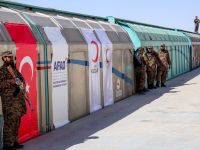By Nida Ramahi
Albawaba.com - Amman
Arab member of Knesset Ahmad Tibi, who recently declared he would run for the prime minister’s post, said that “we sought nomination not on the belief that we might win, but to show Ehud Barak that he is not our only option for candidate.”
In a telephone interview with Albawaba.com, Tibi said that all the Arab-Israeli Knesset members showed their dissatisfaction with Ehud Barak’s policy regarding the peace process and the military actions of the past two months which have resulted in the death of more than three hundred people, the majority of whom were Palestinian, and the injury of more than 8,000.
But with Ehud Barak facing early elections, a number of issues have come to the surface. These issues include what should happen to the faltering peace process, how will the violence end and what will happen if a coalition government is formed, or if Benjamin Netanyahu returns to office.
Albawaba.com tabled these questions, and many more, for MK Ahmad Tibi. This is what he had to say:
Q: What happens now after the early election motion?
A. In the first meeting last week, it passed with a huge majority, but in order for the law to be accepted finally, there should be a second and third reading. I’m dealing with the situation assuming there might be elections next May. At a deeper level, however, there are group efforts on the part of Ariel Sharon’s Likud, Ehud Barak and Shas, aimed at canceling early elections which they fear could take away Knesset seats from them. The polls predict, for example, that the Shas party would win a maximum of 12 seats in an early election against their existing 17 seats. Nobody is interested in shortening their stay in power. So although there has been a first call, I don’t believe that it will go ahead, because too many parties are against it. Sharon is now also opposed to the move since it is likely he would lose against Benjamin Netanyahu who is the more popular candidate.
Q: Ehud Barak has come up with new compromise proposals in an attempt to reach a peace settlement, what do you think of that?
A: The proposals are only propaganda for Israeli consumption. They aren’t real, but rather virtual. You know that [Palestinian President] Yasser Arafat rejected the Camp David agreement which offered to return only 92% of the land agreed upon in the Oslo Accords. Did Barak really believe that Arafat would accept his proposal last week in which he offered him only 50% of this land? No, this was a move to create an internal confederation, not aimed at Arafat or the Palestinian confederation. He’s trying to say to his party, the left: look, I proposed a partial agreement to Yasser Arafat as you asked me to, but Arafat rejected it. The more is also directed at Sharon and others on the right wing saying: I have retracted my Camp David proposals.
Q: Do the Arabs and Arab Israelis want these elections to go forward, or are they apprehensive about the results that new elections might bring?
A: When the Arab Israeli Knesset members went to the first meeting, we wanted to say that we have no confidence in Ehud Barak at all. Our position hasn’t changed.
Q: What about the second and third meetings. Are the Arab-Israeli Knesset members going to maintain their position in view of the fact that it is likely that Benjamin Netanyahu might win the Prime Ministerial post?
A: I am not one of those who are afraid of Benjamin Netanyahu. I am very angry and dissatisfied with Ehud Barak’s position, but if Barak introduces new tangible changes in the week before the second reading, we will reconsider our position. If he does not, our position will remain the same.
Q: Is there a belief that Ehud Barak may be able to come up with some reasonable deal that the Palestinian side can accept?
A: I doubt it, but if that happened and Yasser Arafat accepted the deal, we would reconsider our position.
Q: Since the Arab-Israeli Knesset members have lost their trust in Ehud Barak, and it’s obvious they don’t support Benjamin Netanyahu or Ariel Sharon, what other options do they have?
A: We believe that we shouldn’t just react to the existing situation - whether a Prime Minister implements or fails to implement something. The Arab movement demands change because we haven’t been protected by the government as an Arab minority in Israel and the Israeli police have killed 13 Arab-Israelis. This is the reason I decided to nominate myself as an Arab candidate and run against Barak and Netanyahu. It gives a national Arab alternative for those in the elections who don’t want to vote for Barak.
Q: But do you believe that there will be enough support for Ahmad Tibi versus Benjamin Netanyahu or Ehud Barak?
A: I sought nomination not on the belief that I could win. It was done to show that Ehud Barak is not our only option, and to show that there is a national minority here in Israel that has a strong voice both locally and internationally. We also wanted to distil the political and civil agenda of the Arab minority which the candidates will not do. Frankly speaking, we are challenging the social majority by this nomination by saying that this is only a state for the Jews in which the Arabs and their leaders are marginalized. We want to say that we are willing to take part in the decision making process, or at least influence it
Q: Let’s get back to what’s taking place on the ground. The number of injuries and deaths among the Palestinians, particularly the youths, continues to rise. There doesn’t seem to be any shift of position regarding Jerusalem. There also doesn’t seem to be a change of position on the refugee issue. How are all these issues going to be resolved? There was a belief at one point that Ehud Barak might have the answers. Do you have answers to these difficult questions?
A: I don’t think Ehud Barak is the answer for the Arab minority or the peace process because he failed in the last one year and a half to achieve an agreement or understanding with the (Palestinian) leadership. He was given a lot of chances, and he acted in what I would call “dictation diplomacy”. He also tried to dictate solutions, proposals or agreements to the Palestinian side like what happened at Camp David when Yasser Arafat rejected his proposals. Ehud Barak hasn’t realized yet that we need to put an end to the occupation rather than re-deploy the Israeli forces in the West Bank and Gaza. Mr. Barak hasn’t yet come up with any comprehensive answers that are needed.
Q: What if Netanyahu comes back into office? What would be the perspective and possibilities for Arab-Israelis and Palestinian Arabs?
A: First of all, we are against Benjamin Netanyahu and the right wing. It may not be convenient if Benjamin makes it back as prime minister, but it will not be the end of the world. We as Arabs shouldn’t look at it as a disaster and run to save Ehud Barak from his destiny. He is the reason for the present situation, and we are not the side that should save Barak from his failures again and again when he is doing nothing to promote Palestinian National aspirations.
Q: Has there been much consideration given to giving support to “dovish” candidates such as Yossi Beilen?
A: Yes, we have considered this point, but Yossi Beilen is not willing (to stand for prime minister). Shlomo Ben Ami and Shimon Peres are also not willing but there has been talk about the possibility of Avraham Burg, the speaker of the Knesset. Avraham Burg might stand because he is a well-known rival of Ehud Barak in the Labor party.
Q: At one point, Israel looked towards the United States for a possible solution as major co-sponsors of the peace talks. Many people now feel, however that the US seems to have taken more of a one-sided policy. The “dovish” candidates may soon be out of office, and there is a fear that Benjamin Netanyahu is going to come back as PM. In view of these situations, is it possible to reach a solution?
A: I think the possibility is very low because in order for Ehud Barak to get an agreement, he would need to offer more than was presented at Camp David. I’m not sure if he is willing or able to do so in the period before the election. Palestine-bashing is the usual thing before elections. Palestinian blood is usually one factor in the Israeli political campaign, that’s why I’m not optimistic that there will be any agreements in the coming weeks.
Q: Is there any chance of forming a unity government?
A: The possibility is still there. Sharon and Barak could agree to basic plans for this government. There are attempts beneath the surface to postpone the elections by resurrecting the possibility of a unity government. In these circumstances, I think Barak might be willing to join Sharon in a unity government. Sharon, however, is insisting on tough conditions. If Barak accepts these conditions, it will cause a split within the labor party and that’s something that Barak is not willing to do. Perhaps Sharon will become so worried about early elections that he will try to soften his position and be more understanding of Barak’s positions in order to salvage both their destinies
Q: What’s your point of view regarding the US presidential candidates - Bush versus Gore?
A: The democratic presidency has shown a lot of bias towards Israel. They gave more support to Israel than the Israelis themselves. We would like to see change. We will have to wait and see, however, if the Bush administration is ready to make satisfactory changes. I’m not willing to have the Democrats back in office and Gore is a close friend of Benjamin Netanyahu. The Bush ticket may be better only because it’s subject to less Zionist pressure than the Democratic Party.
© 2000 Al Bawaba (www.albawaba.com)







